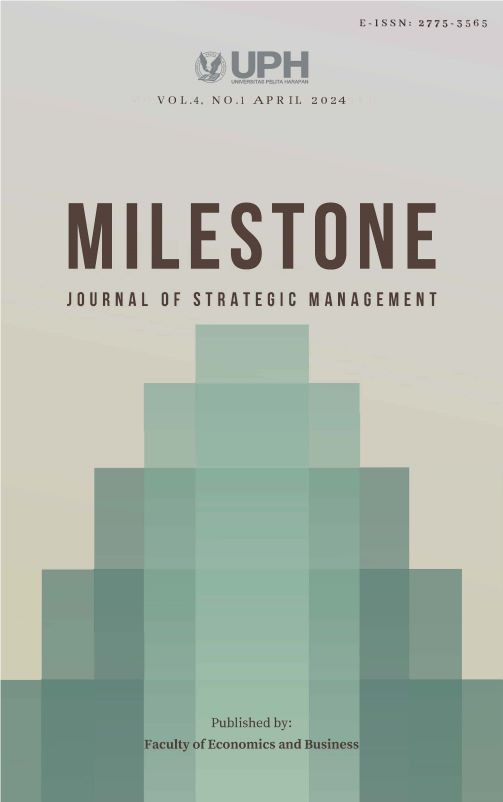APPLICATION OF LEADERSHIP STYLES IN DIGITAL HEALTHCARE SYSTEMS
DOI:
https://doi.org/10.19166/ms.v4i1.8304Keywords:
Leadership, Leadership Style, Digital Era, Healthcare Quality, TraitsAbstract
Leadership will always change according to the times, including leading in digital era. Leadership is the art of inviting and moving other people to work to achieve goals. This research aims to analyze the relationship between transformational leadership and LMX theory that provide valuable frameworks for leadership in the digitalization era by promoting adaptability, innovation, employee engagement, collaboration, and the development of strong interpersonal relationships in a technologically driven work environment. The qualitative approach is used utilizing the databases Semantic Scholar, Google Scholar and PubMed. There is a strong relationship between traits (intelligence, personality, integrity) and leadership. Digital era is an era where society is centered on systems that are integrated online in solving social problems and balancing economic growth. In this digital era, healthcare leaders need to improve their tech savvy skill so they can guide their organizations in adopting and leveraging these technologies. They need to be more proactive, be innovative and dynamic, and set a good example in order to bring the organization up ahead. To improve the quality of digital health services, effective leadership is required.
References
Alanazi, A. T. (2022). Digital leadership: Attributes of modern healthcare leaders. Journal of Medical Science, 14(2), 1-7. https://doi.org/10.7759/cureus.21969
Bernstein, C. (2021, March 11). Digital health (digital healthcare). Teach Target Networking. https://www.techtarget.com/searchhealthit/definition/digital-health-digital-healthcare
Colquitt, J. A., LePine, J. A., & Wesson, M. J. (2013). Organizational behavior: Improving performance and commitment in the workplace. New York: McGrow-Hill.
Fukuyama, M. (2018). Society 5.0: Aiming for a new human-centered society. Japan SPOTLIGHT, 66(6), 47-50.
Gibson, J. L., Ivancevich, J. M., Donnelly, J. H., JR, & Konopaske, R. (2006). Organization: Behavior, structure, processes. New York: McGraw-Hill.
Goldberg, L. R. (1990). An alternative “description of personality”: The big-five factor structure. Journal of Personality and Social Psychology, 59(6), 1216-1229. https://doi.org/10.1037//0022-3514.59.6.1216
Goleman, D. (2004, January). What makes a leader? Harvard Business Review, 82(1), 82-91.
Iyawa, G. E., Herselman, M., & Botha, A. (2016). Digital Health Innovation Ecosystems: From Systematic Literature Review to Conceptual Framework. Procedia Computer Science, 100, 244-252. https://doi.org/10.1016/j.procs.2016.09.149
Jdetawy, L. F. (2018). The prominent leadership style/s adopted by Jordanian firms managers: A case study of the Jordanian private firms. International Journal of Development Research, 8(11), 24343-24367.
Judge, T. A., Bono, J. E., Ilies, R., & Gerhardt, M. W. (2022). Personality and leadership: A qualitative and quantitative review. Journal of Applied Psychology, 87(4), 765-780. https://doi.org/10.1037/0021-9010.87.4.765
Klein, M. (2020). Leadership characteristics in the era of digital transformation. Business and Management Studies An International Journal, 8(1), 883-902. http://dx.doi.org/10.15295/bmij.v8i1.1441
Luthans, F. (2008). Organizational behavior. New York: McGraw Hill.
Mumford, M. D., Zaccaro, S. J., Harding, F. D., Jacobs, T. O., & Fleishman, E. A. (2000). Leadership Skills for a Changing World: Solving Complex Social Problems. Leadership Quarterly, 11(1), 11-35. https://psycnet.apa.org/doi/10.1016/S1048-9843(99)00041-7
Northhouse, P. G. (2016). Leadership theory and practice. California: SAGE Publications.
Robbins, S. P., & Judge, T. A. (2016). Organizational behavior. Pearson Education.
Stoumpos, A. I., Kitsios, F., & Talias, M. A. (2023). Digital transformation in healthcare: Technology acceptance and its applications. International Journal of Environmental Research and Public Health, 20(4), 1-44. https://doi.org/10.3390/ijerph20043407
Vecchio, R. P. (2006). Organizational behavior: Core concepts. Thomson/South-Western.
Westerman, G., Bonnet, D., McAfee, A. (2014). Leading digital: Turning technology into business transformation. Harvard Business Review Press.
Downloads
Published
Issue
Section
License
Authors who publish with this journal agree to the following terms:
1) Authors retain copyright and grant the journal right of first publication with the work simultaneously licensed under a Creative Commons Attribution License (CC-BY-SA 4.0) that allows others to share the work with an acknowledgement of the work's authorship and initial publication in this journal.
2) Authors are able to enter into separate, additional contractual arrangements for the non-exclusive distribution of the journal's published version of the work (e.g., post it to an institutional repository or publish it in a book), with an acknowledgement of its initial publication in this journal.
3) Authors are permitted and encouraged to post their work online (e.g., in institutional repositories or on their website). The final published PDF should be used and bibliographic details that credit the publication in this journal should be included.





